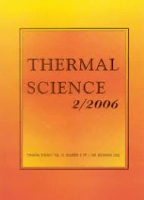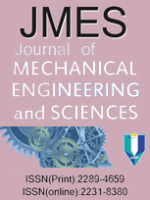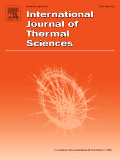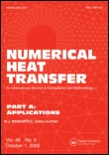
Thermal Science
Scope & Guideline
Bridging research and practice in the realm of thermal science.
Introduction
Aims and Scopes
- Heat Transfer Mechanisms:
Research on various heat transfer mechanisms including conduction, convection, and radiation, exploring how these processes affect thermal systems in different applications. - Computational Fluid Dynamics (CFD):
Utilization of advanced CFD techniques to model and analyze fluid flow and heat transfer phenomena in complex geometries and conditions. - Thermal Energy Storage and Management:
Studies focusing on the development and optimization of thermal energy storage systems, addressing challenges in energy efficiency and sustainability. - Nano- and Micofluidics:
Exploration of heat transfer and fluid dynamics in systems involving nanofluids and microfluidics, emphasizing their unique thermal properties and applications. - Experimental Validation and Method Development:
Innovations in experimental methodologies and validation of theoretical models, ensuring accuracy and reliability in thermal science research. - Magnetohydrodynamics (MHD):
Investigations into the behavior of electrically conducting fluids under magnetic fields, with implications for various engineering applications. - Thermal Management in Electronics and Vehicles:
Research dedicated to the thermal performance and management strategies in electronic devices and high-performance vehicles, addressing heat dissipation and efficiency.
Trending and Emerging
- Machine Learning Applications in Thermal Science:
The integration of machine learning techniques into thermal science research is on the rise, facilitating predictive modeling and optimization of thermal systems. - Sustainable Energy Solutions:
Increasing emphasis on sustainable thermal energy solutions, including solar thermal applications and energy-efficient technologies, aligns with global energy challenges. - Advanced Materials for Heat Transfer:
Research into novel materials, including nanomaterials and phase change materials, is trending as they offer enhanced thermal properties and applications in various sectors. - Complex Flow Dynamics and Turbulence Modeling:
There is a growing focus on complex flow dynamics, especially in turbulent and multi-phase flows, reflecting the need for advanced modeling capabilities in real-world applications. - Thermal Management in Emerging Technologies:
With the rise of new technologies such as electric vehicles and renewable energy systems, there is an increasing focus on thermal management strategies to enhance performance and reliability.
Declining or Waning
- Traditional Heat Exchanger Designs:
There has been a noticeable reduction in studies focused on conventional heat exchanger designs, as researchers shift towards more innovative and efficient solutions such as microchannel and nanofluid-based systems. - Basic Convection Studies:
Research centered on fundamental convection processes appears to be waning, likely due to the growing complexity of thermal problems requiring more advanced modeling techniques. - Static Thermal Analysis:
The focus on static or simplified thermal analysis has diminished as more dynamic and realistic approaches are favored, particularly in applications involving transient conditions. - Single-Phase Fluid Studies:
There has been a decline in publications solely dedicated to single-phase fluid studies, as the community increasingly investigates multi-phase and complex fluid interactions.
Similar Journals

Archives of Thermodynamics
Connecting Scholars through Thermodynamic DiscoveryArchives of Thermodynamics is a reputable journal dedicated to the field of thermodynamics, published by the esteemed POLISH ACADEMY OF SCIENCES. With a robust history since its inception in 2003, this journal serves as a critical platform for disseminating high-quality research aimed at advancing knowledge and technology in thermodynamic systems and processes. Recognized for its contribution to the field, it holds a Q3 ranking in the Physics and Astronomy (miscellaneous) category as of 2023, with a respectable Scopus rank of #148 out of 243, placing it within the 39th percentile. Although it follows a traditional access model, the journal's commitment to scholarly excellence ensures that researchers, professionals, and students alike can benefit from its rich archives and ongoing discussions within the scientific community. Situated in Warsaw, Poland, the journal not only reflects a regional dedication to scientific progress, but also engages with global audiences interested in the evolving landscape of thermodynamic research.

JOURNAL OF ENHANCED HEAT TRANSFER
Exploring the Dynamics of Enhanced Heat TransferThe JOURNAL OF ENHANCED HEAT TRANSFER, published by BEGELL HOUSE INC, is a prominent resource for researchers and professionals in the fields of mechanical engineering, fluid flow and transfer processes, and condensed matter physics. With a history spanning from 1993 to 2024, this journal offers a platform for disseminating cutting-edge research and innovations that enhance our understanding of heat transfer phenomena. Although it operates under a traditional subscription model, its impressive standing is underscored by its Scopus rankings—positioned within the 59th percentile for Mechanical Engineering and 58th percentile for Fluid Flow and Transfer Processes. Additionally, it holds Q2 and Q3 categorizations in relevant fields, reflecting its importance in advancing knowledge and applications in heat transfer technology. This journal effectively bridges the gap between theoretical insights and practical solutions, making it an indispensable tool for academics, industrial practitioners, and students eager to explore advancements in thermal management and efficiency.

Frontiers in Heat and Mass Transfer
Leading the Charge in Energy and Material InnovationsFrontiers in Heat and Mass Transfer is a premier open-access journal published by TECH SCIENCE PRESS that focuses on the interdisciplinary field of heat and mass transfer. Established in 2010, this journal has been pivotal in disseminating high-quality research aimed at advancing the understanding of energy and material transport phenomena. With an impressive commitment to open access, it ensures that all published articles are readily available to researchers, practitioners, and students globally, promoting knowledge sharing and collaboration. The journal currently holds a Q3 ranking in key categories such as Engineering, Materials Science, and Physics and Astronomy, as well as notable positioning in Scopus rankings. With a forward-looking scope extending from 2010 to 2024, Frontiers in Heat and Mass Transfer continues to be an essential platform for innovative research, fostering the development of practical applications across various scientific and engineering domains. We invite you to explore the latest contributions to this evolving field and consider this journal as a vital resource for your academic and professional growth.

Journal of Mechanical Engineering and Sciences
Exploring New Horizons in Mechanical SciencesThe Journal of Mechanical Engineering and Sciences (ISSN: 2289-4659, E-ISSN: 2231-8380), published by UNIV MALAYSIA PAHANG, is a prominent open access journal established in 2011, dedicated to advancing the field of mechanical engineering and associated sciences. Covering a wide array of topics from industrial manufacturing processes to computational mechanics, the journal serves as a vital platform for researchers, professionals, and students to disseminate innovative findings and methodologies. With impressive Scopus rankings, including a place in the 60th percentile for Industrial and Manufacturing Engineering, the journal holds a significant position among its peers, facilitating global academic discourse. Located in Kuantan, Pahang, Malaysia, the journal emphasizes accessibility and collaboration within the engineering community, encouraging submissions that contribute to both theoretical and applied aspects of mechanical engineering.

INTERNATIONAL JOURNAL OF THERMAL SCIENCES
Unveiling the science behind heat and matter.The INTERNATIONAL JOURNAL OF THERMAL SCIENCES is a premier academic journal published by ELSEVIER FRANCE-EDITIONS SCIENTIFIQUES MEDICALES ELSEVIER, focusing on cutting-edge research in the field of thermal sciences. With its ISSN 1290-0729 and E-ISSN 1778-4166, this journal has established itself as a crucial resource for scholars and professionals interested in the thermodynamic principles governing engineering and condensed matter physics. The journal is ranked Q1 in both Condensed Matter Physics and Engineering (miscellaneous), highlighting its exceptional quality and influence, as reflected in its impressive Scopus ranks: #32 out of 307 in General Engineering (89th percentile) and #57 out of 434 in Condensed Matter Physics (86th percentile). Researchers and students alike can benefit from the wealth of articles available, with access options designed to foster a wider dissemination of knowledge within the scientific community. Established in 1973 and ongoing through 2025, the journal invites contributions that advance the understanding of thermal phenomena and their applications, solidifying its importance in driving innovation and insight within these dynamic fields.

NUMERICAL HEAT TRANSFER PART A-APPLICATIONS
Driving excellence in numerical methodologies for heat transfer.NUMERICAL HEAT TRANSFER PART A-APPLICATIONS, published by TAYLOR & FRANCIS INC, serves as a premier outlet for cutting-edge research in the domains of numerical analysis and condensed matter physics. With an ISSN of 1040-7782 and an E-ISSN of 1521-0634, this esteemed journal has steadily maintained its influence in the academic community since its establishment in 1989, continuing its publication into 2024. Currently ranked in the Q2 quartile for both Condensed Matter Physics and Numerical Analysis, it stands as a vital resource for researchers committed to advancing computational methodologies and applications. The journal's Scopus rankings reflect its growing impact, particularly in mathematics, where it is placed in the top 26% of its category. Although not an open-access journal, its comprehensive research articles and detailed applications foster innovation and collaboration, making it essential for professionals and students aiming to deepen their understanding of thermal transfer phenomena through numerical techniques. This journal not only bridges theory and application but also propels forward the field of heat transfer.

ASME Journal of Heat and Mass Transfer
Innovating Heat and Mass Transfer ResearchASME Journal of Heat and Mass Transfer, published by the renowned American Society of Mechanical Engineers (ASME), is a pivotal journal in the fields of mechanical engineering and materials science. With its ISSN 2832-8450 and E-ISSN 2832-8469, this journal aims to disseminate high-quality research focused on the principles and applications of heat transfer and mass transfer phenomena. Despite its recent launch, having converged from 2023 to 2024, it has quickly established a significant presence in the academic community, holding respectable rankings within the Scopus database across various categories—including a 66th percentile rank in Mechanical Engineering. The journal endeavors to foster innovation and collaborative research that advance the frontiers of knowledge in thermal sciences, making it an essential resource for researchers, practitioners, and students keen on exploring the challenges and developments in heat and mass transfer technologies. The journal also embraces an open-access model, ensuring that leading research reaches a broader audience and contributes to global knowledge sharing.

THERMAL ENGINEERING
Pioneering Research in Energy and Power EngineeringTHERMAL ENGINEERING is a premier journal dedicated to advancing the field of thermal engineering, with particular importance in the domains of Energy Engineering, Nuclear Energy, and Power Technology. Published by PLEIADES PUBLISHING INC, this esteemed journal has been providing significant scholarly contributions since its inception, with its converged years spanning from 1970 to 2024. Though currently non-open access, the journal presents a unique avenue for researchers, professionals, and students to explore groundbreaking research and innovative solutions related to energy systems and thermal processes. With a notable impact factor and positioned in the Q3 quartile for both Energy Engineering and Nuclear Energy, THERMAL ENGINEERING ensures the dissemination of high-quality research with a global reach, making it an essential resource for those looking to stay at the forefront of essential energy technologies and engineering advancements.

ISI Bilimi ve Teknigi Dergisi-Journal of Thermal Science and Technology
Connecting Scholars Through Cutting-Edge Thermal ResearchISI Bilimi ve Teknigi Dergisi-Journal of Thermal Science and Technology, published by the Turkish Society of Thermal Sciences and Technology, serves as a pivotal platform for disseminating cutting-edge research in the fields of thermal science, engineering, and materials science. With an ISSN of 1300-3615, this journal not only addresses critical advancements from 2008 to 2013 and 2015 to 2023, but also operates under the auspices of rigorous peer review, contributing to its reputable standing in academia. As a Q4 ranked journal in various disciplines including Atomic and Molecular Physics, Engineering, and Materials Science, it offers researchers and professionals essential insights, though it does not currently operate under an open access model. Situated in Ankara, Turkey, this journal is key to fostering collaboration and innovation among scholars, making it an indispensable resource for students and professionals eager to engage with the latest thermal science methodologies and technologies.

Transactions of the Korean Society of Mechanical Engineers B
Innovating solutions for a dynamic engineering landscape.Welcome to the Transactions of the Korean Society of Mechanical Engineers B, a pivotal journal dedicated to advancing the field of mechanical engineering. Published by the esteemed Korean Society of Mechanical Engineers, this journal serves as a platform for the dissemination of innovative research and practical applications in mechanical engineering and related disciplines. With a focus on fostering knowledge exchange and collaboration, the journal publishes original research articles, reviews, and technical notes that contribute to the understanding and evolution of mechanical systems and technologies. The Transactions of the Korean Society of Mechanical Engineers B, which has been in circulation since 2007 and spans through 2024, is categorized within the Q4 quartile of mechanical engineering rankings and is indexed by Scopus, making it a valuable resource for researchers and professionals aiming to stay abreast of the latest developments in the field. Although it is not open access, its rigorous peer-review process ensures the integrity and quality of the published work, making it essential reading for academics and practitioners alike.